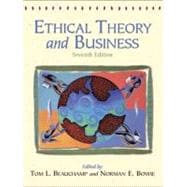
| (NOTE: Each chapter contains an Introduction, Legal Perspectives, Cases and Suggested Supplementary Readings) | |
| Ethical Theory and Business Practice | |
| Fundamental Concepts and Problems | |
| Normative Ethical Theory | |
| Analysis of Cases | |
| The Purpose of the Corporation | |
| Stockholder Management versus Stakeholder Management | |
| Which View Is Right? | |
| Corporate Character and Individual Responsibility | |
| Acceptable Risk | |
| Consumer Risk | |
| Investment Risk | |
| Occupational Risk | |
| Environmental Risk | |
| Investment Risk | |
| The Ethical Treatment of Employees | |
| The Hiring and Firing of Employees | |
| Privacy | |
| Whistleblowing | |
| Diversity and Discrimination in the Workplace | |
| Diversity and Affirmative Action | |
| Sexual Harassment | |
| Marketing and Disclosure of Information | |
| Advertising | |
| Sales | |
| Bluffing | |
| Ethical Issues in Information Technology | |
| Computers and Privacy | |
| Technological Challenges to Intellectual Property | |
| Ethical Issues in International Business | |
| Universals, Relativism and the Problem of Bribery | |
| Human Rights and the Multinational Corporation | |
| Social and Economic Justice | |
| Table of Contents provided by Publisher. All Rights Reserved. |
The New copy of this book will include any supplemental materials advertised. Please check the title of the book to determine if it should include any access cards, study guides, lab manuals, CDs, etc.
The Used, Rental and eBook copies of this book are not guaranteed to include any supplemental materials. Typically, only the book itself is included. This is true even if the title states it includes any access cards, study guides, lab manuals, CDs, etc.